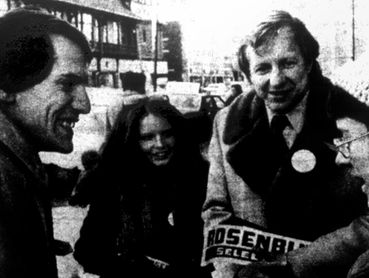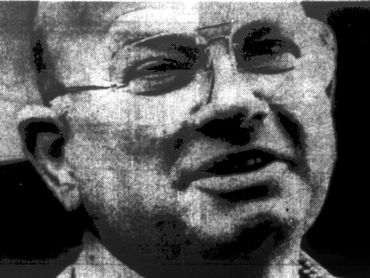One Brookline Election
Voters fed up with politics these days – the mudslinging, the negative ads, the influence of big money – can always turn to local elections to see something a little closer to “democracy in action.” Take board of selectmen elections in Brookline, for example. Every two years, following campaigns that largely consist of lawn signs, living room coffees, and perhaps the odd mailer, voters go to the polls to elect members of the 5-seat board – and there's a good chance they will have shaken the hand of one or more of the candidates before entering the booth. Through the decades, dozens of such board races have been run – some squeakers, some routs – but in looking back at the history of 20th century Brookline, let’s focus on just one such election, the board race of 1981.
Technically, the campaign that year was a five-man contest for two open seats, but most local political wags believed that incumbent board member Robert Stein had re-election in the bag. A senior manager at Raytheon, the hard-working Stein was known for responsiveness to constituents. A piece in the Brookline Tab hints at just how time-consuming his job could be. Stein was said to put in some 20 hours a week into his selectman duties on top of his day job, even installing an extra phone line in his home where he regularly received five or six board-related calls a night. The self-described “compulsive worrier” wasn’t counting any chickens, but it seemed the race was, in reality, a four-man contest for one open spot – the seat recently vacated by retiring selectman Thomas May.
The old axiom, there is no Republican or Democratic way to pick up the trash had some relevance in this non-partisan local election, but the political philosophies and parties of the candidates were well-known. Indeed, when the candidates met for a forum at the Driscoll School, the Brookline Tab noted that they seemed to arrange themselves by ideology: “The five selectmen candidates were asked to sit down together and sure enough they sat down left to New Right.”
The most liberal candidate, and the outsider in the contest, was Ron Rosenblith. Known to many as the “Political Potter,” the long-time campaign operative and compulsive worker had settled down in Brookline, trading his Capitol Hill pottery studio for Beacon Street’s Pottery Plus. The 34-year-old Rosenblith had cut his teeth in politics by going “Clean for Gene” in the 1968 insurgent campaign of Eugene McCarthy and later served in senior campaign roles in the presidential campaigns of liberal icons George McGovern and Ted Kennedy.
He also had experience as the man on the ticket. In 1968, after McCarthy lost, Rosenblith came home to Brookline and, at 21, became one of the youngest candidates in Massachusetts history to run for state senate, nearly beating Republican Oliver Ames after nabbing the Democratic nomination. Although in 1981 he was relatively new to the politics of his own town, Rosenblith seemed to have the Brookline media well in hand. In March, the Tab could not help but wax poetic: “He teaches people to mold lumps of clay as perfectly consistent as teaching people to mold political coalitions.”
Two issues dominated the campaign in 1981 above all others: Proposition 2 ½ and rent control. The voter revolt of 1980 had gone off like a bomb in the state and while each of the candidates took positions against the anti-tax hike referendum – not surprising since the voters of Brookline had voted against Prop 2 ½ in large numbers – the issue still dominated the discussion. The other issue, as always seemed to be the case in Brookline, was the never-ending tenant/landlord battle in town. With his pro-renter views, Rosenblith was pleased to nail down the Brookline Tenant Union endorsement.
As a landlord himself, and the only pro-landlord candidate in the race, Roger Stern had a lane to himself. Having just completed service as school committee chairman and with a history as a big-shot developer around town, Stern was a divisive candidate about whom everyone had an opinion. The candidate seemed comfortable with his contentious profile, agreeing heartily when his brother Matthew told the Chronicle Citizen, “A doer gets in trouble, a ‘don’t doer’ never does.” Meanwhile, another candidate, Henry Wiggin, threatened to split some of the right-of-center vote with Stern. A passionate bird-lover and long-time town meeting member, he urged Brookliners to vote “The Wiggin Way…The Practical Way.” He combined his down-to-earth politics with a strong green streak, supporting open space, nature acquisition, and other stances in what was then called the ecology debate.
The strangest twist of the ’81 campaign certainly revolved around the relations of the Stern family. When 83-year-old Meyer Stern, uncle of Robert Stern, entered the race, he created confusion beyond just the Stein/Stern/Stern ballot. A resident of Babcock Street for more than half a century and a town meeting member for 37 years – and truth be told, a bit of a gadfly – the elder Stern had poor relations with his nephew. Apparently it went back to the Great Depression when Meyer Stern and his brother had a falling out over a shared business and the ill feelings later extended to his nephew opponent. Indeed, in a truly bizarre article that appeared on the front page of the Brookline Chronicle Citizen reporting the election results, Meyer complained of being “harassed and shadowed” by one of his nephew’s very tall campaign secretaries outside the Coolidge Corner Library, before she was “picked up by a red car” belonging to none other than his nephew.
On election day, as expected, the incumbent Robert Stein easily won re-election, securing more than 5,000 votes. The race for the other open seat was swiped by the diligent liberal potter. As the Tab mentioned before election day, Rosenblith’s campaign consisted of “working the streets of Coolidge Corner, many of the MBTA stops during rush hour, and the ‘coffee circuit,’ while Stern’s campaign is relying on mailin rather than pumping the flesh.” In the end, Rosenblith prevailed 4,578 votes to Roger Stern’s 3,471, Wiggin’s 3,323, and Meyer Stern’s 823. While television commercials and airport rallies may have been dominating elections on the national stage, it seemed this very local election largely came down to handshakes.



Above Left: Ron Rosenblith campaigning in Coolidge Corner. (Brookline Tab)
Center: School Committee Chairman Roger Stern. (Brookline Tab)
Above Right: "The Duke" was out on the trail for Ron Rosenblith. (Brookline Chronicle Citizen)